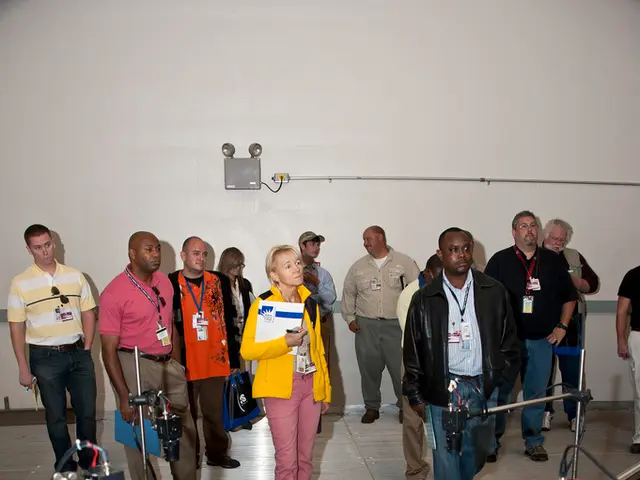GPs in Germany: One-Fourth Eyeing Early Retirement - Reasons, Consequences, and Potential Solutions
One out of every four General Practitioners consider retiring sooner, as per Bertelsmann Foundation's reports. - Family Physicians' Early Departure Forecasted: Nearly a Quarter to Quit Prematurely by Bertelsmann Foundation
Worry within the medical community is mounting as one-fourth of general practitioners (GPs) in Germany are contemplating earlier retirement due primarily to cumbersome bureaucracy and excessive workload. To prolong their careers, these doctors call for less bureaucracy, flexible working hours, and digitalization to streamline routine tasks that consume a significant portion of their time.
On average, these committed professionals clock in 44 hours each week, which is 10 hours more than the average workweek across Germany. However, the Bertelsmann Foundation, which co-conducted a thorough survey with the University of Marburg involving nearly 3,700 GPs from November 2024 to February 2025, stresses that a decline in the number of GP practices does not equate to a deterioration in care. Instead, it highlights untapped potential that can be leveraged to provide more dedicated care.
Uwe Schwenk, Director of the Bertelsmann Foundation, asserts, "What truly matters is how much effective time the GP has for patient care." Nurturing this potential could be pivotal in this current predicament. According to the survey, GPs typically dedicate around 80% of their time to consultations and home visits while spending the remaining portion on administrative tasks, further training, or other activities.
Schwenk also underscores the importance of relieving GPs, especially in the light of the primary care system proposed in the coalition agreement. The idea is for GPs to act as gatekeepers, regulating access to specialist practices. While the notion of better controlling patient flows is sound, Schwenk highlights that taking on this responsibility will demand additional time, necessitating alleviation in other areas to ensure optimal care.
The Bertelsmann Foundation has put forth several solutions to alleviate the complexities that GPs face, including further digitization of tasks like appointment management, data exchange, diagnostics, and treatment processes. However, the success of these digital solutions hinges on their seamless execution in everyday practice, as technical glitches in many practices already hinder productivity.
Another proposed solution is to delegate non-medical tasks to assistants, such as medical assistants or nursing staff. A majority of GPs surveyed agree that such delegation represents a significant relief potential.
While the survey results do not provide explicit insights on how digitization and non-medical professionals can particularly ease the bureaucratic burden and workload, some possibilities can be inferred:
- Electronic Health Records (EHRs) - Adopting digital health records can simplify data entry and record-keeping tasks, thereby reducing administrative workloads.
- Telemedicine and Online Consultations - Expanding telemedicine services can foster more efficient patient consultations, saving time and reducing associated administrative tasks.
- Automated Billing and Insurance Claims - Digitizing billing processes can streamline interactions with insurance providers, decreasing paperwork and burdensome administrative tasks.
- AI and Machine Learning - Using AI to analyze patient data can facilitate informed decision-making, potentially reducing workloads for medical professionals.
While non-medical personnel can help shoulder administrative tasks, healthcare coordinators, data analysts, and social workers can all play crucial roles in improving efficiency and enhancing patient care. The implementation of such strategies could prove instrumental in retaining and empowering the nation's GPs during this critical juncture.
- General Practitioners (GPs)
- Germany
- Bureaucracy
- Workload
- Digitalization
- Telemedicine
- AI and Machine Learning
- Interdisciplinary Collaboration
- Non-Medical Personnel
- Electronic Health Records (EHRs)
- Healthcare Coordinators
- Data Analysts
- Social Workers
- The declining number of GPs in Germany is a concern for the medical community, with one-fourth considering early retirement due to burdensome bureaucracy and excessive workload. To address this issue, there is a call for digitalization, particularly in appointment management, data exchange, diagnostics, and treatment processes.
- In light of the primary care system proposed in the coalition agreement, GPs will need to act as gatekeepers, regulating access to specialist practices. This added responsibility requires alleviation in other areas, which could potentially be achieved through interdisciplinary collaboration with healthcare coordinators, data analysts, and social workers.
- aside from delegating non-medical tasks to assistants, digitizing work processes can help IPs ease their bureaucratic burden and workload. Adopting Electronic Health Records (EHRs) can simplify data entry, telemedicine can foster efficient consultations, and automated billing can streamline interactions with insurance providers. Additionally, using AI to analyze patient data can facilitate informed decision-making, potentially reducing GP workloads.







